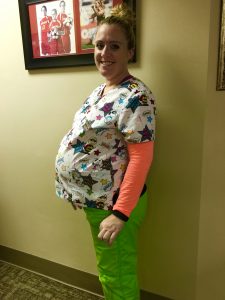Causes of Hip Pain During Pregnancy
If you’re experiencing hip pain during pregnancy, this is often completely normal. Hip pain is especially common during the third trimester. This is because your body is preparing for labor. During this time, your body release hormones that allow your connective tissues to relax, soften and expand. This allows the joints and ligaments near your pelvis to loosen and become more flexible. This is especially important for a healthy birthing experience. Additionally, many pregnant women with hip pain are sore on the side of the body where their baby tends to rest.
Sometimes lower back pain is associated with hip pain during pregnancy. As your pregnancy moves closer to full-term, you may start to notice changes in your posture. This is often paralleled by the increasing weight of your baby.

Megan is an X-ray tech with Orthopaedic Specialists. She has worked throughout her pregnancy and she is scheduled for a C-section soon. Congratulations Megan!!
While hip pain for pregnant women is common, it’s always advisable to pay close attention to your body. If you ever experience sharp, stabbing pain in your hips and lower body, you should consult a physician immediately.
Also, any lower hip pain that begins to wrap around your stomach and on either side of your body could be associated with preterm labor. It’s important to understand the difference between common hip pain symptoms and pain that could indicate other issues.
9 Tips to Ease Hip Pain During Pregnancy
And as any pregnant woman can attest, hip pain is just one of the many symptoms of pain that may come along with pregnancy. Nine months can be a long time to carry added weight. If you’re experiencing hip pain during pregnancy, including discomfort when you are trying to sleep, follow along for some helpful tips from Louisville orthopedic surgeon Dr. Stacie Grossfeld.
- Try a Pregnancy Pillow: This will help alleviate some of that pressure on your hips and pelvis while sleeping. A pillow can be used to adjust to your body shape and support your lower body and stomach.
- Sleep on Your Side: Take some of the pressure off of your lower body and stomach by sleeping on your side with your knees bent.
- Practice Proper Posture: While standing, make sure you keep your shoulders back, head up and pelvis tucked in. Also, avoid wearing high heels if possible because this could cause you to stand differently, throwing off your posture.
- Use Heat: Try using a heating pad on your lower back and hips. You could also start a warm bath to provide some relief to your lower body.
- Take Time to Rest: It is okay to be busy and active while pregnant, but make sure that you take time to relax and give yourself some rest. Try taking the elevator when you would normally choose the stairs.
- Try Stretching: Yoga and pilates designed for pregnant women can be very relaxing and provide relief for your hip pain. Make sure your movements are controlled and slow, and that they do not cause further pain.
- Swap Out Your Old Mattress: If you’re currently using a hard, firm mattress, you may want to consider purchasing an egg crate pad that will help provide some flexibility to your sleep posture.
- Avoid Crossing Your Legs While Seated: Crossing your legs will actually put more pressure on your hips and cause more pain. Try rolling up a towel or use a small cushion to support your legs. Also use a foot rest to support your lower body if available.
- Listen to Your Doctor: If your hip pain becomes too uncomfortable or the location of your hip pain changes, make sure you consult your physician. He or she could provide you with more exercises and other methods to relieve your hip pain during your pregnancy.
Hip pain during pregnancy is typically very normal, especially as your pregnancy progresses. Trying some of the tips described above can help you get some relief for pregnancy-related hip pain.
Remember to listen to your body and take appropriate precautions during this unique experience. And to all of our expecting mothers and families, Orthopaedic Specialists gives you our heartfelt congratulations and best wishes on a happy pregnancy and healthy baby.
For more information about hip pain during pregnancy or other orthopaedic inquiries, call Dr. Grossfeld’s office at 502-212-2663.

Recent Comments